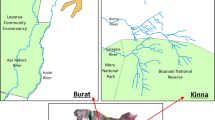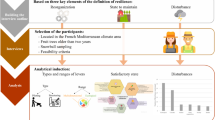Abstract
Indigenous fruit trees, though critical to the local livelihoods in many areas across the world, continue to receive little research and policy attention. In this study, we recorded the perceptions of Indian jujube (ber) growers of Haryana, India, to understand how social-ecological stressors were impacting their livelihoods and how they were responding to the constraints being faced using their own creativity and institutional recommendations. Data were recorded through an exploratory research design combining both quantitative and qualitative approaches. Principal component analysis and variables factor map revealed differential contributions of orchard attributes and adaptive practices to the variability in individual principal components as well as to the cumulative variation. It emerged that despite serious challenges like poor access to the markets, feeble institutional support and the problems of salinity and fresh water scarcity, a large majority (80.0%) of the respondents had moderate to high willingness to continue ber cultivation. Our respondents were almost unanimous that environmentally resilient nature and low input needs make ber an attractive option for the resource-scarce local conditions. We noted, however, that hardy tree nature alone may not be a guarantee to ber groves’ sustainability in the long run and that doable interventions were inevitable to insulate the growers’ livelihoods from risks. Specifically, increased adoption of proven technologies (e.g. mulching, drip irrigation), linking farmers to the markets and organizing them into groups for the pooled use of resources seem absolutely essential to sustain ber-based production systems in face of such challenges.











Similar content being viewed by others
References
Adger, W. N., Eakin, H., & Winkels, A. (2007). Nested and networked vulnerabilities in South East Asia. In L. Lebel, et al. (Eds.), Global Environmental Change and the South-east Asian Region: An assessment of the state of the science. Washington, DC: Island Press.
Akinnifesi, F. K., Sileshi, G., Ajayi, O. C., et al. (2008). Domestication and conservation of indigenous Miombo fruit trees for improving rural livelihoods in southern Africa. Biodiversity, 9, 72–74. https://doi.org/10.1080/14888386.2008.9712888.
Anonymous. (2013). Working group report on productivity enhancement of crops in Haryana. Haryana Kisan Ayog, Government of Haryana. Retrieved September 28, 2019 from http://www.haryanakisanayog.org/Reports/WG%20Report%20on%20Productivity%20Enhancement%20of%20Crops%20in%20Haryana.pdf.
Arndt, S. K., Clifford, S. C., & Popp, M. (2001). Ziziphus—A multipurpose fruit tree for arid regions. In S. W. Breckle, M. Veste, & W. Wucherer (Eds.), Sustainable land use in deserts. Berlin: Springer. https://doi.org/10.1007/978-3-642-59560-8_41.
Awasthi, O. P., & More, T. A. (2009). Genetic diversity and status of Ziziphus in India. Acta Horticulturae, 840, 33–40. https://doi.org/10.17660/ActaHortic.2009.840.2.
Bal, J. S. (2016). Development and production of Indian jujube (ber) in India. Acta Horticulturae, 1116, 15–22. https://doi.org/10.17660/ActaHortic.2016.1116.3.
Bal, J. S., Sharma, D. R., & Singh, P. (2013). Historic ber (Jujube) trees in golden temple Amritsar (Punjab)-twenty years of consistent care. Acta Horticulture, 993, 37–41.
Balikai, R. A. (2009). Insect pest status of ber (Ziziphus mauritiana Lamarck) in India and their management strategies. Acta Horticulture, 840, 461–474. https://doi.org/10.17660/ActaHortic.2009.840.65.
Barbero-Sierra, C., Marques, M. J., Ruíz-Pérez, M., et al. (2016). Farmer knowledge, perception and management of soils in the Las Vegas agricultural district, Madrid, Spain. Soil Use Manage, 32, 446–454. https://doi.org/10.1111/sum.12278.
Bembridge, T. J., & Tshikolomo, K. A. (1998). Communication and decision making among fruit growers in the Phaswana area of Northern Province. South African Journal of Agricultural Extension, 27, 19–29.
Bhandari, D. C., Meghwal, P. R., & Lodha, S. (2014). Horticulture based production systems in Indian arid regions. In D. Nandwani (Ed.), Sustainable horticultural systems—Issue, technology and innovation (pp. 19–49). Cham: Springer International Publishing. https://doi.org/10.1007/978-3-319-06904-3_2.
Bouhoun, M. D., Marlet, S., Brinis, L., et al. (2011). A survey of the combined effects of waterlogging and salinity on fruit yield in the date palm groves of the Wargla basin, Algeria. Fruits, 66, 11–24.
Corbeels, M., Shiferaw, A., & Haile, M. (2000). Farmers’ knowledge of soil fertility and local management strategies in Tigray, Ethiopia. IIED-Drylands Programme. Retrieved October 1, 2019 from https://pubs.iied.org/pdfs/7421IIED.pdf?.
Daniel, J. N. (2009). Value chain analysis in relation to processing and marketing of three underutilized fruits in India. Acta Horticulture, 806, 505–512. https://doi.org/10.17660/ActaHortic.2009.806.63.
David, S., & Asamoah, C. (2011). The impact of farmer field schools on human and social capital: A case study from Ghana. The Journal of Agricultural Education and Extension, 17, 239–252. https://doi.org/10.1080/1389224X.2011.559076.
Eitzinger, A., Binder, C. R., & Meyer, M. A. (2018). Risk perception and decision-making: Do farmers consider risks from climate change? Climatic Change, 151, 507–524. https://doi.org/10.1007/s10584-018-2320-1.
Gajanana, T. M., Dinesh, M. R., Mysore, S., et al. (2016). Multivarietal orchards—An age-old conservation practice in mango. In B. Sthapit, et al. (Eds.), Tropical fruit tree diversity—Good practices for in situ and on-farm conservation (pp. 226–236). Oxon: Routledge.
Gebauer, J., El-Siddig, K., El Tahir, B. A., et al. (2007). Exploiting the potential of indigenous fruit trees: Grewia tenax (Forssk.) Fiori in Sudan. Genetic Resources and Crop Evolution, 54, 1701–1708. https://doi.org/10.1007/s10722-006-9178-1.
Habiba, U., Shaw, R., & Takeuchi, Y. (2012). Farmer’s perception and adaptation practices to cope with drought: Perspectives from Northwestern Bangladesh. International Journal of Disaster Risk Reduction, 1, 72–84. https://doi.org/10.1016/j.ijdrr.2012.05.004.
Han, H. Y., & Zhao, L. G. (2009). Farmers’ character and behavior of fertilizer application-evidence from a survey of Xinxiang County, Henan Province, China. Agricultural Sciences in China, 8, 1238–1245. https://doi.org/10.1016/S1671-2927(08)60334-X.
Harvey, C. A., Rakotobe, Z. L., Rao, N. S., et al. (2014). Extreme vulnerability of smallholder farmers to agricultural risks and climate change in Madagascar. Philosophical transactions of the Royal Society of London. Series B, Biological Sciences, 369, 20130089. https://doi.org/10.1098/rstb.2013.0089.
HKA. (2012). Working group report on development of horticulture in Haryana. Haryana Kisan Ayog (HKA), Govt. of Haryana. Retrieved October 1, 2019 from http://www.haryanakisanayog.org/Reports/Report_on_Horticulture.pdf.
Hooda, P. S., Sindhu, S. S., Mehta, P. K., & Ahlawat, V. P. (1990). Growth, yield and quality of ber (Zizyphus mauritiana Lamk.) as affected by soil salinity. Journal of Horticultural Scienc, 65, 589–593. https://doi.org/10.1080/00221589.1990.11516097.
ICAR-CSSRI. (2015). ICAR-Central Soil Salinity Research Institute Vision 2050. Indian Council of Agricultural Research, New Delhi. Retrieved September 28, 2019 from https://www.researchgate.net/publication/305350773_Vision-2050.
Ismail, S. M., & Almarshadi, M. H. S. (2013). Effect of water distribution patterns on productivity, fruit quality and water use efficiency of Ziziphus jujuba in arid regions under drip irrigation system. Journal of Food, Agriculture and Environment, 11, 373–378.
Jaenicke, H. & Höschle-Zeledon, I. (Eds.) (2006). Strategic framework for underutilized plant species research and development: With special reference to Asia and the Pacific, and to Sub-Saharan Africa. In International centre for underutilized crops, Colombo, Sri Lanka and global facilitation unit for underutilized species (pp. 33). Rome, Italy.
Jamadar, M. M., Balikai, R. A., & Sataraddi, A. R. (2009). Status of diseases on ber (Ziziphus mauritiana Lamarck) in India and their management options. Acta Horticulture, 840, 383–390. https://doi.org/10.17660/ActaHortic.2009.840.53.
Jamnadass, R. H., Dawson, I. K., Franzel, S., et al. (2011). Improving livelihoods and nutrition in sub-Saharan Africa through the promotion of indigenous and exotic fruit production in smallholders’ agroforestry systems: A review. International Forestry Review, 13, 338–354.
Koley, T. K., Kaur, C., Nagal, S., et al. (2016). Antioxidant activity and phenolic content in genotypes of Indian jujube (Zizyphus mauritiana Lamk.). Arabian Journal of Chemistry. https://doi.org/10.1016/j.arabjc.2011.11.005.
Kroma, M. M. (2006). Organic farmer networks: Facilitating learning and innovation for sustainable agriculture. Journal of Sustainable Agriculture, 28, 5–28. https://doi.org/10.1300/J064v28n04_03.
Kumar, P. (2016). Rain water harvesting and artificial recharge in Haryana. Journal of Environmental Science and Health, Part C, 3, 1–3.
McMurran, M. (2002). Motivational interviewing with offenders: A systematic review. Legal and Criminological Psychology, 14, 83–100. https://doi.org/10.1348/135532508X278326.
Meghwal, P. R., Khan, M. A., & Tewari, J. C. (2007). Growing ber (Ziziphus mauritiana Lam.) for sustainable income and employment in arid and semi arid regions. ICAR-Central Arid Zone Research Institute, Jodhpur, India. Retrieved October 7, 2019 from http://www.cazri.res.in/publications/KrishiKosh/112-(GROWING%20BER).pdf.
Meghwal, P. R., & Kumar, P. (2014). Effect of supplementary irrigation and mulching on vegetative growth, yield and quality of ber. Indian Journal of Horticulture, 71, 571–573.
Meghwal, P. R., Kumar, P., & Singh, D. (2018). Climate variability during flowering and fruiting reduces fruit yield of ber (Ziziphus mauritiana) in Western Rajasthan. Journal of Agriculture and Ecology, 6, 31–38.
Mitra, S. K., Pathak, P. K., & Chakraborty, I. (2010). Potential underutilized tropical fruits of India. Acta Horticulture, 864, 61–68. https://doi.org/10.17660/ActaHortic.2010.864.7.
NICRA. (2019). District wise agricultural contingency plans. National Innovations in Climate Resilient Agriculture (NICRA), ICAR, India. Retrieved October 7, 2019 from http://www.nicra-icar.in/nicrarevised/index.php/state-wise-plan.
Niles, M. T., & Mueller, N. D. (2016). Farmer perceptions of climate change: Associations with observed temperature and precipitation trends, irrigation, and climate beliefs. Global Environmental Change, 39, 133–142. https://doi.org/10.1016/j.gloenvcha.2016.05.002.
O’Brien, K. A., Leichenko, R., Kelkar, U., et al. (2004). Mapping vulnerability to multiple stressors: Climate change and globalization in India. Global Environmental Change, 14, 303–313. https://doi.org/10.1016/j.gloenvcha.2004.01.001.
Orchard, S. E., Stringer, L. C., & Claire, C. H. (2016). Mangrove system dynamics in Southeast Asia: Linking livelihoods and ecosystem services in Vietnam. Regional Environmental Change, 16, 865–879. https://doi.org/10.1007/s10113-015-0802-5.
Pareek, O. P. (2001). Ber. In K. L. Chadha (Ed.), Handbook of horticulture (pp. 154–157). New Delhi: Indian Council of Agricultural Research.
Pathak, R. K. (2003). Status report on genetic resources of Indian gooseberry-aonla (Emblica officinalis Gaertn.) in South and Southeast Asia. Retrieved October 15, 2019 from http://agroecommerce.com/lms/download/fruits/aonla/profile_aonla.pdf.
Pohlert, T. (2014). The pairwise multiple comparison of mean ranks package (PMCMR). R package. Retrieved September 12, 2019 from http://CRAN.R-project.org/package=PMCMR.
Rathore, V. S., Tanwar, S. P. S., Kumar, P., & Yadav, O. P. (2019). Integrated farming system: Key to sustainability in arid and semi-arid regions. Indian Journal of Agricultural Sciences, 89, 181–192.
RKVY. (2018). Success story under RKVY. Retrieved October 15, 2019 from https://rkvy.nic.in/Uploads/SucessStory/KARNATAKA/2018/2018043419Horticulture.pdf.
Sankhla, N., Gehlot, H. S., Davis, T. D., et al. (2006). Ber (Ziziphus) fruits: Apple of arid regions of Indian Thar desert. Acta Horticulture, 712, 449–452. https://doi.org/10.17660/ActaHortic.2006.712.53.
Schreckenberg, K., Awono, A., Degrande, A., et al. (2006). Domesticating indigenous fruit trees as a contribution to poverty reduction. Forests, Trees and Livelihoods, 16, 35–51. https://doi.org/10.1080/14728028.2006.9752544.
Sharma, D. K., & Singh, A. (2017). Emerging trends in salinity research: An Indian perspective. In S. K. Gupta & M. R. Goyal (Eds.), Soil salinity management in agriculture (pp. 45–66). Palm Bay, FL: Apple Academic Press. https://doi.org/10.1201/9781315365992-17.
Sharma, S. K., Singh, R. S., & Bhargava, R. (2013). Arid horticulture: An overview. Annals of Arid Zone, 52, 251–264.
Sharma, D. K., Singh, A., & Sharma, P. C. (2016). Role of ICAR-CSSRI in sustainable management of salt-affected soils-achievements, current trends and future perspectives. In Proceedings of 4th international agronomy congress (November 22–26, 2016) (pp. 91–103). https://krishi.icar.gov.in/jspui/bitstream/123456789/3364/1/Role%20of%20ICAR-CSSRI%20in%20sustainable%20management%20of%20salt-affected%20soils.pdf.
Sileshi, G., Akinnifesi, F. K., Ajayi, O. C., et al. (2007). Contributions of agroforestry to ecosystem services in the Miombo eco-region of eastern and southern Africa. African Journal of Environmental Science and Technology, 1, 68–80.
Singh, R. S. (2005). Marketing of citrus fruits in mid-hills of Jammu and Kashmir. In J. Prasad (Ed.), Encyclopaedia of agricultural marketing (pp. 289–296). New Delhi: Mittal Publications.
Singh, K. (2017). Evaluation study on ‘impact of higher allocation of horticulture budget from 2014-15 to 2016-17 on its activities/achievement in Haryana. Centre for Research in Rural and Industrial Development, Chandigarh. Retrieved October 12, 2019 from http://esaharyana.gov.in/Portals/0/HORTIC~1.PDF.
Singh, B., Chandra, A., & Singh, R. S. (2011). Determination of root distribution in ber (Ziziphus mauritiana) by root excavation. Indian Journal of Agricultural Sciences, 81, 473–475.
Singh, V. K., & Singh, J. (1997). Profitability of ber cultivation in arid region of Haryana. Indian Journal of Agricultural Economics, 52, 626.
Singh, R. K., Singh, A., & Sharma, P. C. (2019). Successful adaptations in salt affected agroecosystems of India (p. 118). Karnal: ICAR-Central Soil Salinity Research Institute.
Singh, R. K., Zander, K. K., Kumar, S., et al. (2017). Perceptions of climate variability and livelihood adaptations relating to gender and wealth among the Adi community of the Eastern Indian Himalayas. Applied Geography, 86, 41–52. https://doi.org/10.1016/j.apgeog.2017.06.018.
Smit, B., & Skinner, M. (2002). Adaptation options in agriculture to climate change: A typology. Mitigation and Adaptation Strategies for Global Change, 7, 85–114. https://doi.org/10.1023/A:1015862228270.
Snelder, D. J., Klein, M., & Schuren, S. H. G. (2007). Farmers preferences, uncertainties and opportunities in fruit-tree cultivation in Northeast Luzon. Agroforestry Systems, 71, 1–17. https://doi.org/10.1007/s10457-007-9086-1.
Sthapit, B., Vasudeva, R., Rajan, S., et al. (2015). On-farm conservation of tropical fruit tree diversity: Roles and motivations of custodian farmers and emerging threats and challenges. Acta Horticulture, 1101, 69–74. https://doi.org/10.17660/ActaHortic.2015.1101.11.
Styger, E., Rakotoarimanana, J. E. M., Rabevohitra, R., & Fernandes, E. C. M. (1999). Indigenous fruit trees of Madagascar: Potential components of agroforestry systems to improve human nutrition and restore biological diversity. Agroforestry Systems, 46, 289–310. https://doi.org/10.1023/A:1006295530509.
Sunderland, T., Achdiawan, R., Angelsen, A., et al. (2014). Challenging perceptions about men, women, and forest product use: A global comparative study. World Development, 64, S56–S66. https://doi.org/10.1016/j.worlddev.2014.03.003.
Team R Core. (2018). R: A language and environment for statistical computing. Vienna, Austria: R Foundation for Statistical Computing.
Tey, Y. S., & Brindal, M. (2012). Factors influencing the adoption of precision agricultural technologies: A review for policy implications. Precision Agriculture, 13, 713–730. https://doi.org/10.1007/s11119-012-9273-6.
Tomar, O. S., Minhas, P. S., Sharma, V. K., et al. (2003). Performance of 31 tree species and soil conditions in a plantation established with saline irrigation. Forest Ecology and Management, 177, 333–346. https://doi.org/10.1016/S0378-1127(02)00437-1.
Vizcayno, J. F., Hugo, W., & Alvarez, J. S. (2014). Appropriate seed varieties for small-scale farmers: Key practices for DRR implementers. Food and Agriculture Organization of the United Nations. Retrieved October 15, 2019 from http://www.fao.org/3/a-i3768e.pdf.
Yadav, J., Gaur, R. K., & Devi, M. (2018). Varietal/germplasm screening of Ber, Ziziphus mauritiana (Lamk) against Ber fruit fly, Carpomyia vesuviana (Costa) under semi-arid conditions of Haryana. Journal of Entomology and Zoology Studies, 6, 908–911.
Yadav, R. P., Gupta, B., Bhutia, P. L., & Bisht, J. K. (2017). Socioeconomics and sources of livelihood security in Central Himalaya, India: A case study. International Journal of Sustainable Development & World Ecology, 24, 545–553. https://doi.org/10.1080/13504509.2016.1239233.
Yiridoe, E. K., & Anchirinah, V. M. (2005). Garden production systems and food security in Ghana: Characteristics of traditional knowledge and management systems. Renewable Agriculture and Food Systems, 20, 168–180. https://doi.org/10.1079/RAF2005112.
Acknowledgements
We thank all the respondents for sharing their knowledge with us. Logistic support provided by the Director, ICAR-CSSRI, Karnal, is acknowledged.
Funding
This study was conducted with financial support from Rashtriya Krishi Vikas Yojana (RKVY), Haryana, India.
Author information
Authors and Affiliations
Corresponding author
Ethics declarations
Conflict of interest
The authors declare that they have no conflict of interest.
Ethical approval
Study was conducted following standard ethical protocols.
Additional information
Publisher's Note
Springer Nature remains neutral with regard to jurisdictional claims in published maps and institutional affiliations.
Electronic supplementary material
Below is the link to the electronic supplementary material.
Rights and permissions
About this article
Cite this article
Singh, A., Singh, R.K., Kumar, A. et al. Adaptation to social-ecological stressors: a case study with Indian jujube (Ziziphus mauritiana Lam.) growers of north-western India. Environ Dev Sustain 23, 3265–3288 (2021). https://doi.org/10.1007/s10668-020-00717-x
Received:
Accepted:
Published:
Issue Date:
DOI: https://doi.org/10.1007/s10668-020-00717-x




